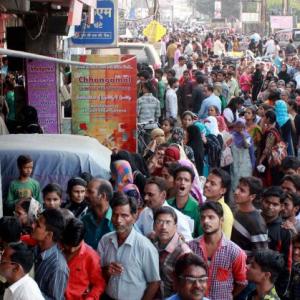'With curtailment in spends in marriage, it has impacted consumption'.
There is a need for stimulus, as India is essentially a consumption economy'.

Siraj Chaudhry, chairman and chief executive officer, Cargill India, the wholly-owned subsidiary of Cargill Inc, has a ground-up view of India’s commodities business, straddling segments like edible oil, grain and oil seeds, sugar, cotton and animal nutrition.
In an interview to Sudipto Dey/ Business Standard, Chaudhry shares his views on the impact of demonetisation of high value currency on the edible oil-cum-food major:
How has demonetisation impacted the edible oil and the food business?
There is a reduced offtake in the oil business. There has been a reduction in demand as the trade channels -- that used to deal in cash down the line -- have got impacted. The concern is that stocks are there, but people do not have the money to lift them. There has also been certain amount of short term disruption in movement of goods. The inventory in the trade channel pipeline is shrinking. The animal feed and nutrition businesses have also seen some reduction in sales.
Interestingly, we are seeing an increase in sale in our flour business. This is because lot of the flour business is in the unorganised sector. The cash crunch has hurt the (unorganised) business. This is working in favour of the organised players.
On the consumer spend side, the organised retail is doing better, while the kirana stores are seeing a reduction in customer footfalls.
Could you quantify the drop in demand that you are experiencing?
In edible oil the sales are down anywhere between 20 to 30 per cent from what we were expecting. What has also impacted sales is that this is the marriage season. With curtailment in spends in marriage, it has impacted consumption. In general usage of edible oil usually goes up in winters. That will be dampened till the time the cash crunch lasts.
Any visibility by when you expect the sales to come back?
We are in the business of selling essential commodities. For the kind of products that we sell, I don’t see it lasting very long.
How much will this impact your plans for the current financial year?
We follow a June-to-May financial year globally. Our business heads do not expect any major impact on our annual plans. Our earnings for the year may remain unaffected, despite the drop in volumes. In the immediate term we may earn less, but by May (next year) we hope to level it.
Given the current disruption in business, would it make sense to roll out a transformative tax reform like GST by April next year?
GST can fast-track the change the government is trying to bring to the operating environment. It will be more in the interest of business to be GST compliant. Certainly, the incentive not be GST-compliant will be lower.
Do you expect something in Budget 2017 to soothe industry’s nerves?
I hope so, given the turbulence in the economy and the likely impact on rate of growth. There is a need for stimulus, as India is essentially a consumption economy. It will be in the interest of the government to keep that consumption train running, with measures to kick-start consumption.
What is the wish list like in the recent agri and food industry’s pre-budget meeting with the finance minister?
One of the things we said is that for agriculture produce, as under GST one is aiming for one tax rate across the country, it is important that all the state levies and cess are subsumed in the GST. Otherwise, if they are not the whole purpose of having one unified agriculture market is defeated. Currently there is no clarity how local cess will be treated under GST.
The other recommendation was that the protein market in India is growing -- like poultry, diary, pulses, oil seeds etc. We don’t allow OGL import of some of these. However, the supply line for these needs to be created, rather than wait for a crisis to create a supply line.










